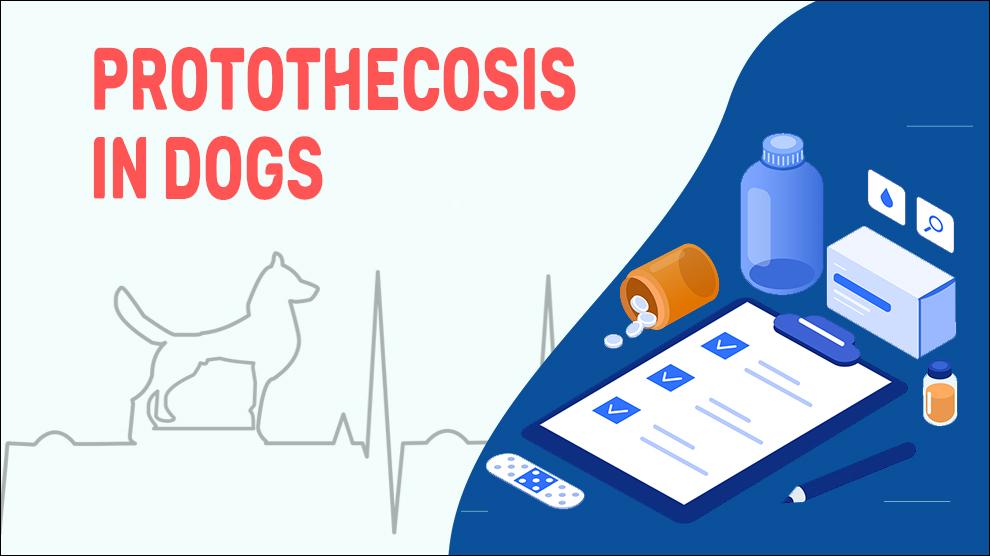Protothecosis is a rare infection caused by saprophytic, achlorophyllic algae (genus Prototheca) that causes severe gastrointestinal (GI) pathology, cutaneous, disseminated diseases, and ocular conditions.
Five species of Prototheca are currently recognized, including P. wickerhami, P. zopfii, P. P. stagnora, blaschkeae, and P. ulmea; recently P. cutis, which was isolated from a human patient was genetically distinct and was added to the list. In aforesaid, P. zopfii and P. wickerhami are recognized as pathogenic to humans, dogs, and cattle.
So far, P. zopfii -2 genotypes are recognized in dogs. Disease caused by P. zopfii genotype 2 may follow a more aggressive clinical course than that caused by P. wickerhamii. Prototheca wickerhamii is often associated with concurrent disease or immunosuppression. The pathogen is found in raw or treated sewage, tree slime, salt, freshwater sources, animal excrement, fish tanks, and soil.
Dogs may develop systemic and cutaneous forms of protothecosis.
Systemic involvement: GI tract, nervous system, and eye.
Cutaneous involvement: lesions that are chronic, exudative, ulcerative, and/or nodular occur on the body and extremities.
Symptoms Of Protothecosis
GI symptoms:
- Straining when defecating
- Tarry feces, Intermittent black or bloody diarrhea
- Weight loss
- Vomiting
Ocular symptoms:
- Redness in the “sclera” of the eye
- Inflammation, pain in the eye
- blindness - may be bilateral or unilateral
Neurological symptoms:
- Head tilt
- Loss of muscle control
- Circling
- Lethargy
- Gait problems
- Seizures/Paralysis
Cutaneous symptoms:
- Draining ulcers
- Nodules
- Thickening of the outer layer of skin
- lymph nodes involvement
- Skin irritations
Treatment Options For Protothecosis
As of now, canine protothecosis has no approved or curative treatments.
Management of clinical signs is best achieved in the promptness of the treatment. Treatment should be initiated before the event of paralysis or contracture. Most Puppies typically die even with treatment and some adult dogs survive even without treatment.
Treatment includes a course of antibiotics, anti-inflammatory drugs, and pain relievers.
Other drugs and the need for surgery will be entirely at your vets’ disposal after determining the severity of the infection.
Home Remedies For Protothecosis
Follow the appropriate monitoring schedule for your pet given by the Veterinary neurologist, as recommendations may vary for each individual.
Discuss home treatments with your vet to ensure they’re won’t mess with other medications.
This may include dietary changes, exercise, supplements to administer, and other holistic treatments.
Prevention Of Protothecosis
- Herding dogs’ access to the feeding areas should be restricted, and pastures should be reduced.
- Takes steps to avoid contamination of livestock feed or feeding area with animal feces.
- Do not allow dogs to ingest raw meats from suspected sources
- Do not administer glucocorticoids or other immunosuppressive drugs to Seropositive dogs.
Affected Breeds Of Protothecosis
There is no breed disposition.
Additional Facts For Protothecosis
1. Causes:
Prototheca zopfii– 2 genotypes
- zopfiivariant 1 (first genotype): This variant’s pathogenicity is weak and it is rare in dogs
- zopfiivariant 2 (second genotype): This is the most potent variant of Protothecazopfii. This causes responsible for the bulk of protothecosis cases in dogs.
- wickerhamii: This often causes cutaneous conditions and this is more common in humans s well as in some dogs.
2. Types:
Two types of protothecosis in dogs are recognized:
- Systemic- This type of protothecosis is common in dogs and can spread almost to any part of the body.
- Cutaneous- This type is less common in dogs than the systemic type.
3. Mortality:
There is no documented mortality connected with cutaneous forms. Systemic types of protothecosis have a higher mortality rate.
4. Diagnosis:
- Complete blood count, chemistry panel
- Urinalysis
- Abdominal x-rays
- Aqueous and vitreous samples (from the eyes)
5. Prognosis:
Most dogs with cutaneous protothecosis recover within a week and the prognosis is good. However, recovery takes longer in severe protothecosis cases, as complications may need additional treatment. Systemic protothecosis can be treated initially but if left untreated over a long time, it gets worsened and there is no cure but the related symptoms (pain) can be prevented or may be managed.
When To See A Vet
Contact your vet right away, if you notice any of the following:
- Tarry feces, Intermittent black or bloody diarrhea
- Redness in the “sclera” of the eye
- Severe unsteadiness or loss of muscle control, Confusion or disorientation
Food Suggestions For Protothecosis
- 40% protein – animal meat(avoid raw meat), Lean boiled meats, seafood, eggs
- 50% fresh vegetables
- 10% carbohydrates – brown rice, Barley (pearled), grains
- Fatty acids – cooked egg yolks, plant oils, sunflower, corn
- Avoid trans fat, a small amount of beef fat, steak fat
- Calcium – powdered or crushed eggshells, supplements
- Antioxidant foods
Conclusion
Long periods (>2 months) of treatment may be needed for dogs with systemic infections. Treatment of Dogs that exhibit neurological symptoms is long-term but has a poor prognosis. Early diagnosis and promptness of treatment are effective in many cases. In cases of muscular contracture, early diagnosis will yield successful results.

















